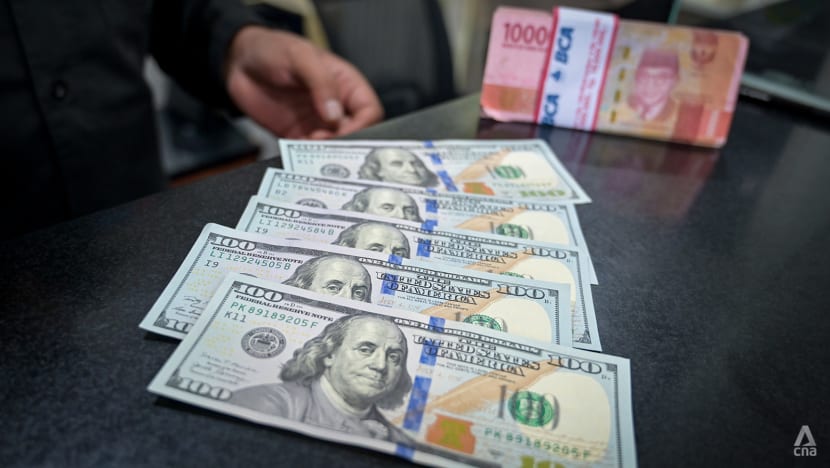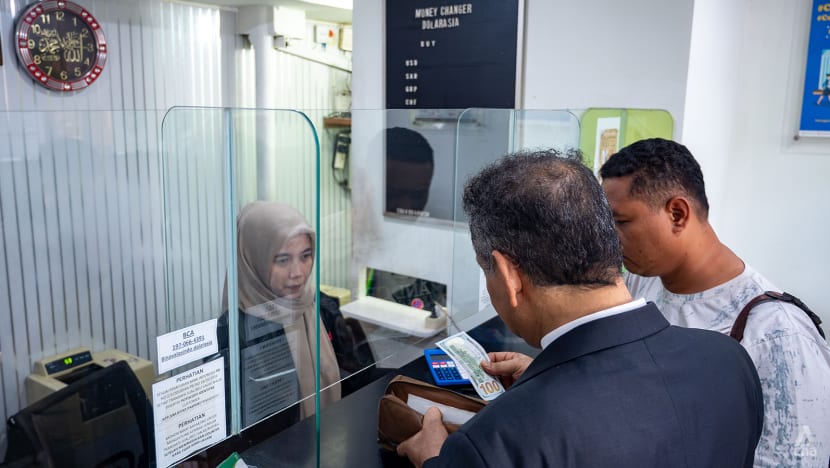Indonesia reassures citizens as rupiah weakens to 4-year low against US dollar
The rupiah is among Asian currencies that have weakened against the US dollar this year. It’s a double-edged sword for workers, and industries that import raw materials will be hit, economists say.

The Indonesian rupiah has slid to its weakest level in four years. (Photo: CNA/Danang Wisanggeni)

This audio is generated by an AI tool.
JAKARTA: Indian national Avinash Rao, 38, is more cautious about his spending these days.
The tax advisor, who works in Jakarta, is paid in rupiah and remits money to his family in India regularly.
With Indonesia’s currency weakening in recent months, Mr Rao has had to cough up more of his salary in order for his family to receive the same amount in Indian rupees as before.
“A few months ago, I used to get 1 Indian rupee if I paid 181 Indonesian rupiah,” he said.
“Since the rupiah depreciated against the United States dollar and other major currencies, I need to spend 195 rupiah to purchase 1 Indian rupee.”
Workers who get paid in US dollars, on the other hand, are not complaining.
Malaysian expatriate Letchumi, who works in the pulp and paper sector and goes by one name, told CNA: “I do benefit given that USD is stronger now.”
In Indonesia, some have cheered while others' pockets have been hit as the rupiah sank to a four-year low last week against the US dollar as the market reopened after 10 days of Idul Fitri holidays.
It weakened to 16,200 per US dollar, prompting intervention by Indonesia’s central bank to support the currency. On Friday (Apr 19), the rupiah was 16,257 against the dollar, according to Bank Indonesia.
It is not alone – many Asian currencies have tumbled against the US dollar this year.
Last week, the finance chiefs of Japan and South Korea expressed concerns over the fall of the yen and won against the dollar.
The yen has lost about 8 per cent to the dollar this year, while the won’s slide is about 6 per cent. The figure is about 5 per cent for the rupiah.
Other Asian currencies that have lost value against the US dollar this year include the Chinese yuan, Malaysian ringgit, Philippine peso and Singapore dollar.
WHY IS THE RUPIAH WEAKENING?
There are several reasons why the rupiah is weakening, said Mr Andry Satrio Nugroho, an economist at the Institute for Development of Economics and Finance (INDEF).
“The main factor is high inflation in the US, which prompts the (Federal Reserve) to increase its interest rate and there are no signs it will be lowered,” he said.
The Fed’s interest rate is currently at a 23-year high of about 5.25 per cent to 5.5 per cent.
Another reason why the rupiah is underperforming is the war in the Middle East.
“Both trigger capital outflow from developing countries,” said Mr Andry.
Higher Fed interest rates attract investment capital as investors seek higher returns on bonds and interest-rate products, according to financial media website Investopedia.
In turn, global investors sell their investments denominated in their local currencies for investments denominated in US dollars. This results in a stronger US dollar.
For the rupiah in particular, concerns about a new government taking office in October may also have played a role in its depreciation, noted Mr Mohammad Faisal, executive director of the Centre of Reform on Economics (CORE) Indonesia, a think tank which focuses on research in economy and industry.
"Especially how the fiscal management will be under the new elected government," he said.
While it is still early days for the rupiah’s depreciation against the dollar to have a major impact on prices domestically, analysts are concerned it may lead to bigger economic problems.
Among other things, there could be a price hike in imported goods and weaker purchasing power, they said.

INDUSTRIES THAT IMPORT RAW MATERIALS WILL BE HIT
Industry Minister Agus Gumiwang Kartasasmita said the rupiah’s weakening will impact Indonesia’s industrial competitiveness, especially sectors that use raw materials from abroad.
Raw materials for industries such as automotive, electronics, textile and even pharmaceuticals will feel the impact, said Mr Faisal.
Imported goods including garlic, wheat and soybeans may also become pricier.
Mr Andry said a weak rupiah means the government needs more money to subsidise fuel since Indonesia is a net importer of oil.
“If this is not addressed, it will have the potential to increase the price of subsidised and non-subsidised fuel, as well as increase the basic electricity tariffs,” he surmised.
If the rupiah remains weak, the cost of the government’s infrastructure projects will also go up due to higher material costs, he noted.
“The end result is a weakening of people’s purchasing power which will decrease people’s consumption,” he said.

BUSINESSES WANT STABLE CURRENCY
For now, some businesses told CNA the weaker rupiah is less of a concern than a stable currency, which would make planning easier.
“If the rupiah is weak, for example 16,000 (against US$1), it is not a problem to us as long as it remains 16,000, (not 14,000 tomorrow and 17,000 after that),” said Mr Kafi Kurnia, a marketing consultant for agricultural produce such as fruits. “For us business people, having a stable exchange rate is very important.”
Fluctuation is what “makes things difficult”, he said.
“Experienced importers are very cautious. If the currency is unstable, they will not buy a lot,” said Mr Kafi, the former head of the Indonesian Association of Fruit and Vegetable Importers and Exporters.
With a weaker rupiah, companies dealing in imported goods will adjust accordingly, he said. The rupiah has depreciated for the past 10 years against the US dollar, so the current situation is not new to business owners, he added.
“They can also negotiate with the suppliers and ask them for a discount since the US dollar is currently strong,” added Mr Kafi.
Suppliers usually do not mind giving discounts as fruits are perishable, he claimed. “They are also under pressure to sell as much as possible and as fast as possible.”
Meat importers have also not felt the impact of a stronger US dollar yet, and are more concerned with how the rupiah fares against the Australian dollar, said Mr Suhandri, secretary general of the Indonesian Meat Importers Association (ASPIDI).
“Our biggest imports are from Australia, then the US followed by New Zealand,” said Mr Suhandri, who goes by one name. The rupiah has been more stable against the Australian dollar in the last five years.
But meat importers are monitoring the situation closely as consumers have limited purchasing power, he said.
The government has tried to assure the public that the country’s economy is under control.
Last Thursday (Apr 18), Coordinating Minister for Economic Affairs Airlangga Hartarto said Indonesia’s economic growth forecast for 2024 is around 5 per cent – higher than the projected global economic growth of 3.2 per cent, as well as the average of 4.2 per cent among developing economies.
Mr Airlangga said the weak rupiah is the result of the strong US economy, and the government will monitor the situation.
“We will monitor it first because the exchange rate is not something we respond to on a daily basis,” he said.
“But if we look further, the government's foreign exchange reserves in Bank Indonesia are still large, US$136 (billion). So there's nothing to worry about.”
Related:
MIGRANT WORKERS BENEFIT, TRAVELLERS FORK OUT MORE
Mr Andry predicts the rupiah will not return to 15,000 against the US dollar any time soon.
Economist Mr Faisal believes the rupiah will continue to fluctuate against the US dollar, but hopes the situation will soon improve.
It will be more expensive for Indonesians who are planning trips abroad to buy the US dollar, but Indonesian migrant workers who want to send money home from overseas will benefit, he noted.
For travellers like Michelle, who is Indonesian and asked to be identified only by her first name, it boils down to timing and luck.
Due to travel to the US next month for a holiday, she bought US dollars months in advance when the rupiah was around 15,500 against the US dollar.
Her early preparations – aimed at avoiding a bottleneck in the lead-up to Idul Fitri this month – saved her nearly 500,000 rupiah.
“To me the (latest) currency exchange rate does not have much impact,” said the 39-year-old. “Because whatever I need to pay with US dollar, I have paid in advance already.”
Tax advisor Mr Avinash remains upbeat. “Since the fundamentals of the Indonesian economy are strong - inflation is manageable - I have reasons to be optimistic,” he said.
















